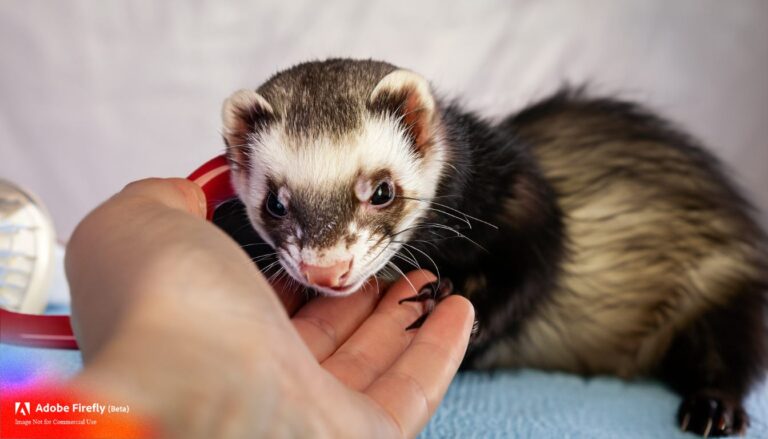
Are you tired of cleaning up after your ferret’s messes? Well, I’ve got some good news for you! In this article, I’ll be sharing my expert tips and tricks on how to successfully litter potty train your ferret. Litter training your furry friend not only keeps your home clean and odor-free, but it also provides them with a designated space to do their business. So, if you’re ready to say goodbye to those messy accidents and hello to a well-trained ferret, keep reading!
Key Takeaways
- Litter potty training is important for ferrets as it helps maintain a clean and odor-free home, simplifies cleanup, reduces the risk of health issues, creates a stress-free environment, and encourages proper behavior.
- Understanding your ferret’s natural instincts, such as burrowing tendencies, scent-marking behavior, and cleanliness, is crucial for successful litter training.
- Choosing the right litter box and litter, considering factors like size, material, litter type, scent control, and bedding material, is essential for effective litter potty training.
- Introducing the litter box to your ferret by selecting the right spot, making it inviting, utilizing scent-marking, and using positive reinforcement is the first step in the training process.
- Training your ferret to use the litter box requires consistency and patience, including choosing the right spot, making it inviting, utilizing scent-marking, using positive reinforcement, and being consistent and patient.
- Troubleshooting common litter training challenges, such as accidents outside the litter box and litter scattering, requires addressing issues with litter box size, cleanliness, location, enrichment, and bedding material.
- Maintaining a clean and hygienic litter box is crucial for successful litter potty training and involves daily scooping, regular litter changes, washing the litter box, using appropriate cleaners, monitoring for urine odor, and considering litter box liners.
Why litter potty training is important for ferrets
Litter potty training is a crucial aspect of ferret ownership. As an experienced ferret expert, I can confidently say that training your ferret to use a litter box offers numerous benefits for both you and your furry friend. Let me share with you some important reasons why litter potty training is important for ferrets:
- Maintaining a Clean and Odor-Free Home: When you successfully litter train your ferret, you can say goodbye to messy accidents and unpleasant odors around your home. Having a designated spot for your ferret’s bathroom needs helps keep your living environment clean and fresh.
- Simplifying Cleanup and Maintenance: With a litter-trained ferret, cleaning their living space becomes much easier. Instead of constantly scrubbing floors and carpets, you can simply clean and replace the litter in their designated litter box.
- Reducing the Risk of Health Issues: By teaching your ferret to use a litter box, you are also minimizing the chances of them ingesting their own waste. This can help prevent health issues, such as gastrointestinal problems, which can be costly and stressful to treat.
- Creating a Stress-Free Environment: Ferrets are naturally clean animals, and providing them with a litter box gives them a sense of security and comfort. A designated bathroom area helps satisfy their instinctual need for cleanliness and provides a familiar space for them to relieve themselves.
- Encouraging Proper Behavior: Litter potty training promotes good behavior in your ferret. They will quickly learn that using the litter box is the appropriate way to handle their bathroom needs, reducing the likelihood of accidents outside of the designated area.
Now that you understand the importance of litter potty training for ferrets, it’s time to dive into the strategies and tips that will help you successfully train your ferret to use a litter box. Stay tuned for the upcoming sections where I’ll share expert advice to make the training process smooth and efficient.
Understanding your ferret’s natural instincts
As a ferret owner, it’s crucial to understand your pet’s natural instincts in order to effectively potty train them. By doing so, you can tailormake your training methods to align with their behavior and preferences. Here are a few key insights into your ferret’s instincts:
- Burrowing tendencies: Ferrets have a strong natural instinct to burrow and dig. In the wild, they would create dens and tunnels for nesting and hunting. Understanding this instinct is essential when selecting the right litter box and bedding material.
- Scent-marking behavior: Ferrets are scent-marking animals, which means they use urine and feces to mark their territory. This instinctual behavior can be harnessed during litter training, as they naturally seek out designated areas to do their business.
- Cleanliness: Contrary to popular belief, ferrets are clean animals. They have a natural instinct to keep their living area as clean as possible. By tapping into this instinct, you can train them to use a litter box and maintain a hygienic environment.
By recognizing and working with these natural instincts, you can set the stage for successful litter potty training. In the next section, I’ll share some expert tips to help you get started on the right track. Stay tuned!
| Key Instincts | Importance in Litter Training |
|---|---|
| Burrowing tendencies | 🌟🌟🌟🌟🌟 |
| Scent-marking behavior | 🌟🌟🌟🌟 |
| Cleanliness | 🌟🌟🌟🌟 |
Choosing the right litter box and litter for your ferret
When it comes to litter potty training your ferret, one of the most important decisions you’ll make is choosing the right litter box and litter. Here are some key factors to consider:
1. Size and design of the litter box: Ferrets are active and playful creatures, so it’s essential to choose a litter box that is large enough for them to comfortably use. Look for a box that is at least 18 inches long and 6 inches deep. Additionally, consider a box with low sides for easy access.
2. Material of the litter box: There are various types of litter boxes available, including plastic, metal, and ceramic. Plastic boxes are lightweight and easy to clean, while metal and ceramic boxes are more durable but may be heavier.
3. Litter type: Ferrets have sensitive respiratory systems, so choosing a litter that is safe and dust-free is crucial. Avoid clumping litters, as these can cause blockages if ingested. Opt for litter made from paper pellets, recycled newspaper, or natural plant fibers.
4. Scent control: Ferrets are scent-marking animals, so it’s important to choose a litter that helps control odor. Look for litters that are specifically formulated to neutralize smells and keep your ferret’s living area fresh.
5. Bedding material: Along with the right litter, consider the bedding material you use in your ferret’s cage or litter box. Avoid using cedar or pine shavings, as these can be harmful to their respiratory system. Instead, opt for soft bedding made from fleece or paper.
By carefully selecting the right litter box and litter for your ferret, you set the foundation for successful litter potty training. Now, let’s move on to expert tips on how to get started with the training process.
Introducing the litter box to your ferret
When it comes to litter potty training ferrets, introducing them to the litter box is an essential first step. This process is all about getting your furry friend familiar with the concept of using a specific area for their bathroom needs. Here are some tips to help you successfully introduce the litter box to your ferret:
- Choose the right spot: Selecting the right location for the litter box is crucial. Ferrets are intelligent animals and prefer to have their litter box in a quiet and private area. Find a spot in your home that is easily accessible to your ferret but away from their eating and sleeping areas.
- Make it inviting: A clean and inviting litter box is more likely to attract your ferret’s attention. Ensure that the litter box is cleaned regularly to keep it fresh and odor-free. Using a litter box with lower sides can also make it easier for your ferret to access.
- Scent-marking, their natural instinct: Ferrets are scent-marking animals, so it can be helpful to place a small amount of their waste or soiled litter in the litter box. This will encourage them to associate the box with their bathroom area.
- Positive reinforcement: Encourage your ferret to explore the litter box by placing some of their favorite toys or treats near it. This positive reinforcement will help them associate the litter box with positive experiences.
Remember, each ferret is unique, and they may require different amounts of time and patience to adjust to using a litter box. Be consistent with the training process and reward your ferret whenever they use the litter box correctly.
Now that your ferret is familiar with the litter box, it’s time to move on to the next step: teaching them how to use it. Stay tuned for expert tips on how to train your ferret to use the litter box effectively and successfully in the next section.
Training your ferret to use the litter box
When it comes to litter potty training ferrets, consistency and patience are key. Here are some expert tips to help you train your ferret to use the litter box effectively:
- Choose the right spot: Selecting the right location for the litter box is essential. Place it in an area that your ferret frequents, such as their play area or a corner of their cage. This will make it easier for them to find and use the litter box.
- Make it inviting: Create an inviting environment for your ferret by making the litter box cozy and comfortable. Add a small towel or bedding material to the box to make it more appealing for them to use. Ferrets have a strong instinct to burrow, so consider using materials like shredded paper or soft fabric for bedding.
- Utilize scent-marking: Ferrets are scent-marking animals, which means they use their urine and feces to mark their territory. You can use this natural behavior to your advantage during litter training. Place a small amount of their soiled bedding material or feces in the litter box to help them recognize it as a designated bathroom spot.
- Use positive reinforcement: Positive reinforcement is an effective training technique for ferrets. Whenever your ferret uses the litter box, give them praise and treats to reinforce the behavior. This will encourage them to continue using the litter box consistently.
- Be consistent and patient: Litter potty training takes time and consistency. Be patient with your ferret and continue to reinforce the behavior. If accidents happen, gently clean up the mess and redirect your ferret to the litter box. With consistent training and positive reinforcement, your ferret will learn to use the litter box reliably.
Remember, each ferret is unique, and it may take some time for them to fully grasp litter training. Stay consistent with your efforts and provide positive reinforcement throughout the process. Soon enough, your ferret will be using the litter box like a pro.
Troubleshooting common litter training challenges
Litter training your ferret can sometimes come with challenges. Here are some common issues you may encounter and how to troubleshoot them:
1. Accidents outside the litter box
If your ferret is having accidents outside the litter box, it’s essential to address the issue promptly. Here are some steps you can take to troubleshoot this problem:
- Check the size of the litter box: Ensure that the litter box is the appropriate size for your ferret. If it’s too small, they may struggle to use it comfortably.
- Clean the litter box regularly: Ferrets are clean animals, so if the litter box becomes dirty or smells bad, they may refuse to use it. Clean the litter box daily to maintain a pleasant environment.
- Consider the location: Make sure the litter box is in a quiet and accessible spot for your ferret. Avoid placing it near their food and water bowls or in busy areas where they may feel hesitant to use it.
- Monitor their behavior: Observe your ferret’s behavior to identify any potential underlying health issues, such as urinary tract infections. If accidents persist, consult a veterinarian for further evaluation.
2. Digging or scattering litter
Ferrets have a natural instinct to dig, which can lead to litter scattering. If you’re dealing with this issue, follow these troubleshooting tips:
- Choose the right litter: Opt for heavier or clumping litter that’s less likely to be scattered when your ferret burrows or digs.
- Use a litter box with higher sides: Select a litter box with higher sides or attach a litter guard to prevent litter from being kicked out.
- Consider a litter mat: Place a litter mat around the box to catch any stray litter and minimize messes.
- Provide enrichment: Make sure your ferret has plenty of toys, tunnels, and activities to keep them mentally stimulated and satisfy their burrowing instincts.
- Revisit litter box placement: Check if the location of the litter box is causing any issues. Experiment with moving it to a different spot that your ferret feels more comfortable with.
- Adjust bedding material: Ferrets may have preferences for certain bedding materials. Try experimenting with different options to see
Maintaining a clean and hygienic litter box
One of the key aspects of successful litter potty training for ferrets is maintaining a clean and hygienic litter box. A clean litter box not only ensures the comfort and well-being of your ferret but also helps reinforce good litter habits.
Here are some important tips to keep your ferret’s litter box clean:
- Scoop the litter box daily: I make sure to scoop out any solid waste from the litter box every day. This not only prevents odors from building up but also encourages my ferret to continue using the litter box.
- Change the litter regularly: Depending on the size of your ferret and the number of litter boxes you have, it’s important to change the litter every few days or as needed. This helps maintain cleanliness and freshness.
- Wash the litter box: I clean the litter box with mild soap and warm water at least once a week. This helps remove any lingering smells or bacteria and keeps the litter box in a hygienic condition.
- Use appropriate cleaners: When cleaning the litter box, it’s essential to use pet-safe cleaners or a mixture of vinegar and water. Avoid using harsh chemicals as they can be harmful to your ferret.
- Monitor for signs of urine odor: If you notice a strong urine odor even after scooping and changing the litter, it may be a sign of a health issue like a urinary tract infection. In such cases, it’s important to consult a veterinarian for further guidance.
- Consider using litter box liners: Litter box liners can make cleaning and maintenance easier. They help contain the litter and make it simpler to dispose of waste. However, some ferrets may be inclined to chew on the liners, so it’s important to monitor their behavior.
By following these tips and maintaining a clean and hygienic litter box, you can create a pleasant and comfortable environment for your ferret to use the litter box consistently. Remember, consistency and cleanliness are key to successful litter potty training.
Conclusion
Successfully litter potty training ferrets is essential for creating a clean and hygienic environment for your furry friends. By understanding their natural instincts to burrow and scent-mark, we can choose the right litter box and bedding materials that cater to their needs.
Selecting the appropriate litter box size and material, along with the right litter type and scent control, is crucial for encouraging consistent litter box usage. Regular maintenance, such as daily scooping, frequent litter changes, and proper cleaning with mild soap and water, helps to keep the litter box fresh and odor-free.
By following these tips, you can ensure that your ferrets have a comfortable and pleasant experience with their litter box. Remember to monitor for any signs of urine odor and consider using litter box liners for added convenience.
With patience and consistency, you can successfully litter potty train your ferrets, creating a harmonious living space for both you and your furry companions.
Frequently Asked Questions
Q: Why is litter potty training important for ferrets?
A: Litter potty training is important for ferrets to maintain cleanliness and hygiene in their living area. It also helps in preventing accidents and keeping the ferret’s environment odor-free.
Q: Are ferrets naturally inclined to use a litter box?
A: Yes, ferrets have a natural instinct to burrow and dig, which can be harnessed by providing a suitable litter box. They are also scent-marking animals, which can aid in their litter training.
Q: How do I choose the right litter box for my ferret?
A: When selecting a litter box for your ferret, consider factors such as size, material (preferably low front for easy access), and having a secure locking mechanism.
Q: What litter should I use for my ferret’s litter box?
A: Choose a litter that is safe and absorbent, such as recycled paper, wood pellets, or corn cob bedding. Avoid clumping, dusty, or aromatic litters.
Q: How should I maintain a clean litter box for my ferret?
A: To maintain a clean litter box, scoop it daily to remove waste, change the litter regularly, wash the litter box with mild soap and water, use appropriate cleaners, monitor for urine odor, and consider using litter box liners for easy cleaning.
Q: Are there any additional tips for successful litter potty training?
A: Yes, make sure to set up a litter box in every ferret-accessible area, praise and reward your ferret for using the litter box, and be patient and consistent with training.






